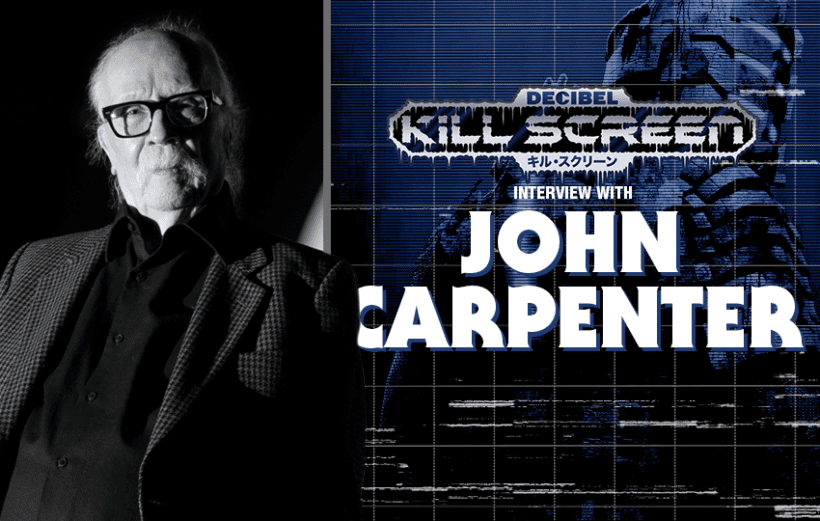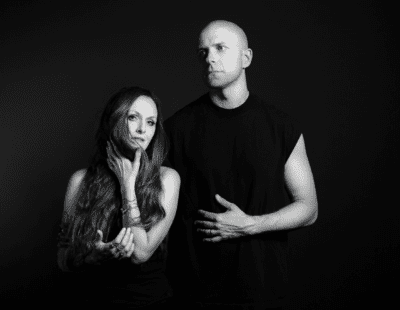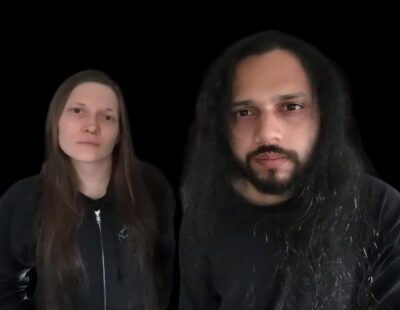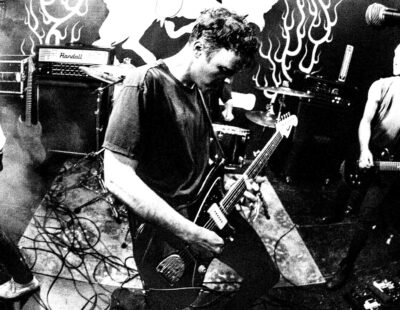
“You guys are nerds, are you?” What followed was a tension-shattering bout of laughter from your eager co-columnists, already halfway through our most star-struck interview to date. It was our guest who less threw out a jab and more stated the obvious after disappointingly learning that Kill Screen was incapable of carrying much of a conversation about his love of basketball save for a few distant childhood memories of NBA Jam. “There’s nothing wrong with that!” he reassured us as we took in the moment, but best believe that when the legendary John Carpenter calls us nerds, we wear that with pride. You’re god damned right we’re nerds.
Hailed for his incredible body of work as a director (Halloween, Escape From New York, The Thing, Big Trouble in Little China, They Live and much more, as if you didn’t know), it’s his original albums written with son Cody Carpenter and godson Daniel Davies that have brought him a well-deserved resurgence in popularity. As synthwave acts such as Perturbator, Carpenter Brut and GosT are in the midst of an electronic music heyday in the extreme music scene, it’s the compositions of Carpenter to which they owe a great deal of credit. The now 76-year old Renaissance man of the underground enjoys his current title of musician, but its his decades-long passion for video games which finds him cast as today’s player character in the Kill Screen arcade. His fondness for the Dead Space series—the one game he wishes he could adapt into a movie—and the works of Burch siblings Ashly and Anthony are well known, and though he has previously discussed this topic in the past with the likes of The A.V. Club and the London Games Festival, well… he hasn’t discussed it with us. With his latest album, Lost Themes IV: Noir, due to be released on May 3 via Sacred Bones Records, it was the perfect opportunity for two unabashed nerds to share their excitement with the Master of Horror himself.
Though the following transcript covers the majority of our time with John Carpenter, those looking for some analog DLC can find an exclusive segment of our interview in the latest issue of Decibel, available now in the store. And if you don’t want to miss out on any of the fun, be sure to sign up for a subscription.
Your first game was Sonic the Hedgehog in 1992. What do you remember of that experience?
Well, I was making a movie at the time, so it was near the end of shooting. I was up in Inverness, California, when I had a home there and I got the game. I can’t remember the box that I played on. Oh, what was the name of it? God…
The Sega Genesis?
That’s what it was. And I started playing it. I had no idea what the hell I was doing. I just got fascinated with it. Regardless of its kind of “for children” appeal, it had a lot of depth to it. You had to be good to play this thing, and, of course, I wasn’t. I think I got stuck on the second level for days and days. That’s where I started. And then my son [Cody Carpenter] here in L.A., we got back [and] he began to introduce me to other games. He had a natural inclination towards them, hand-eye coordination was unbelievable. We played [Cyber Stadium Series] Base Wars, which is kind of a futuristic baseball deal—very primitive, but fun. If you screwed up and got killed, then you got beaten up in this cutscene mercilessly. My son just loved that. Oh, he loved it. And of course, I began to complain. We did several things, but I remember at one point he moved me to the first Halo game. God, I was bad. Oh, man. I was terrible. But anyway, that’s where it started.
Do the two of you still bond over gaming to this day?
Sure! My son right now lives in Japan. The only time I get to see him is when we’re either working on an album or doing a movie score, but he comes back and we pick a game and try to play it. Two player is really good.
Do you find that you two pick similar games or do different games catch your interest?
He’s much more open than I am to games. I’m kind of stuck on certain action games and stuff like that. But he plays a lot of Japanese games, which is beyond me.
You were writing music well before you encountered your first video game. But a lot of the early games especially—and continued on to now—they’ve had a very electronic base to their soundtracks. Have there been any game soundtracks that have impressed you to the point of thinking differently about your compositions or the synthesizer as an instrument?
Well, Mega Man. I love the theme of Mega Man. Stuck really with me. I love that. There’s a bunch of them I loved. The minute I hear the theme for Sonic the Hedgehog, the very first one [Green Hill Zone], when I hear that music suddenly all my problems go away. I can’t explain it, it’s just so great.
What have you been playing lately?
I’ve been obsessed with a game called Fallout 76. I love this game. And a lot of people didn’t like it, but over the years it’s evolved. It just keeps getting bigger and bigger and more action and more stuff is happening. I love it. God, what am I playing right now? Horizon: Forbidden West. I love that game. Are you familiar with that game?
I’ve [James] got about 100 hours into that one and still have not completed the storyline.
Yeah, talk about dense. It’s a big game. And, Jesus, another couple I’m playing, they escape my 76-year-old memory right now.
You mentioned Horizon, you mentioned Fallout, and another one you really like is the Borderlands series.
Oh, I love it! Except for the last one [New Tales from the Borderlands], I didn’t care for that much, which was unfortunate.
What was the hangup on that one?
The writing. The writing wasn’t that good. They had Anthony Burch writing for them, and he was spectacular, but they changed writers, and the characters suffered. How can you get better than Tiny Tina, I ask you? Do you know who that is?
Absolutely. Did you get to play Tiny Tina’s Wonderlands?
I did, yes.
The combination of the post-apocalyptic, technological dystopia, contrasted with the high fantasy of Dungeons & Dragons was really an interesting space to explore. The comedy of the series—
That was the big thing. Anthony claims that he is inspired by the humor of Big Trouble in Little China, so how could I not like it? [Laughs]
You seem to almost minimize your impact, or at least you have a great sense of humility about your impact on video games and movies and music—
What impact?
From our little world of underground, extreme music, I think the entirety of the synthwave genre owes great debt to you. They name you specifically about your contribution to the synthesizer as an instrument, and your compositions, and your atmosphere. In [regards to] games, are you familiar with the game Carrion?
No, I’m not.
It’s a side-scroller that looks like it could’ve been made for the Sega Genesis or Super Nintendo. People often describe it as a video game adaptation of The Thing, but instead of playing as people, you play as the monster.
[Laughs]. Yeah, okay.
Do you ever see elements of the games you play where you can make a direct line to the work you’ve done?
Eh, no. Why should I waste my time on that? I’d rather play the game, that’s what’s fun!
For sure. Back to Borderlands and Horizon and Fallout, I’m seeing a common thread of these high-technology, post-apocalyptic settings. Is that a particularly interesting set piece for you?
Yeah, sure! Isn’t that for you guys? Come on now! It’s a lot of fun. I also just like a straight shooter. Do you remember a game called Black? An old game, I really love that game. I’ve played so many games, my god.
You’ve mentioned sometimes a focus on the world, and then other times you’ve mentioned characters. Is there any one thing that hooks you right away?
That hooks me right away… I don’t know how to answer that. The game is like a narrative, and if you’re sucked into the narrative, you’re sucked in—it’s good. Or not. I’ve gotten games with high hopes, and then started to play them, and it’s like, Eugh, you know? For one reason or another, whether it’s technically, or the writing, the art, whatever it is.
The Last of Us and Dead Space are personal favorites of yours. Do you enjoy horror games much beyond that?
I don’t know. I don’t know much about them. There’s one that I truly love [Dead Space]. It had a couple moments of fear in it. After a while, you kind of get used to [it]. Every game has tasks that you have to perform. You get used to some of the things that happen in games, like fighting a big monster, fighting a bunch of monsters, whatever it is. And you get used to those after a while. Very seldom does it surprise you.
When it comes to horror, you actually got to contribute to the writing of the game F.E.A.R. 3.
I did very little on that in terms of writing. That was Steve Niles who did most of it. He invited me along and I decided to do it, and I didn’t learn too much about how to put a game together. That’s what I’m curious about. In some cases, I learned more by a trip to… I can’t remember the company. They had a VR deal. I went into the room and all these people sitting by computers, I guess writing code. I don’t understand what the fuck that means.
Did you get to experience VR gaming?
Yeah, I did. There’s a deal in the movement, at least at the point I was doing it. You couldn’t move at a certain speed. I don’t know what it was. I don’t understand it. It wasn’t exactly a free movement game with VR. I don’t know why. Maybe they’ve corrected that now. I’m sure they have.
It’s still very much in its infancy. It’s not something I’ve [Michael] really experienced much in my life. I get pretty bad vertigo, so I can’t really partake in that, unfortunately.
Yeah, I don’t care about that. That’s not what I’m in it for. I’m not in for the thrill, I’m in it for the story and the characters and et cetera. I’m all about story. Everything is about story. The only way that horror works is a great story. Always has.
What would you say are some of the greatest horror stories that you’ve encountered through video games?
I don’t know if I’ve encountered any. Dead Space, I suppose, would be the best. Although you guys have got to explain to me what the fuck a Marker is. No idea what the hell that does, and that’s what the center plot line of these Dead Space games is about, the marker. It’s the perfect Hitchcock MacGuffin, which is the thing the characters are all obsessed with, but the audience doesn’t care about. We don’t care about markers. Who knows what it does? “Oh, it collects energy.” Who knows? I don’t know. I don’t care about that. That’s not why I’m playing the game.
You’ve mentioned in the past that if you were to do a movie adaptation of a game, it would be Dead Space. But are there any games that you’ve played that you wish that you had the opportunity to score?
Sure, a bunch. And they all escape my 76-year-old memory now. I would love to have scored Dead Space, it would be one right up my alley. That’s an easy one. I just have to go through a list. I don’t know that I’d be very good at some games. Horror is something I’ve loved since I was a kid, so that’s pretty easy to deal with.
Do you think you would have a very different approach to writing a score for a game than you would for a record or for a film?
Well, I’ve just done a main title theme to an upcoming game, Toxic Commando. But no, it’s not different. See, I just make music the same way I’ve always made music, and now I have enlisted the aid of my son and godson [Daniel Davies]. If you want me and a score from me, we have to do it my way.
You brought up Toxic Commando, and we saw the trailer for that from Summer Game Fest 2023. Beyond the score, do you have any more involvement with that?
Well, I played it! [Laughs]
You weren’t brought on to assist with the story?
I wish I was, but no, I wasn’t. I was not brought on as a creative force, except they wanted to use my name, so they paid me to use my name.
Well, they’ve already gotten our dollars. It was successful.
Oh, okay. Good!
Other than Michael Myers appearing as a character in the game Dead By Daylight, it’s been over 20 years since a movie of yours has been adapted into a video game, with 2002’s The Thing. With the advancements that games have made over the past 20 some years, do you feel like there are any other movies from your library that you wish would be given the video game treatment, that you feel would lend itself to the modern mechanics of video games?
Oh, there’s a bunch. I think Big Trouble in Little China would, Assault on Precinct 13 would, the central part of it. I mean, there’s a bunch of them, but sure.
Personally, I [Michael] would absolutely love to see an In the Mouth of Madness game. I think that would be really incredible.
[Laughs] Really? Oh my god. Okay, you can have it for a price.
[Laughs] Unfortunately Decibel Magazine does not pay us enough to acquire those rights.
Oh, it doesn’t? Ah, shoot. Darn.
Also in that time, a number of your movies have been either remade or rebooted by other directors and similarly we’re seeing a lot of games these days being remade, remastered, rebooted, [or otherwise] brought up to speed to modern sensibilities. Given your experience with the remake of your movies, does it kind of color your opinion of any of these games that are being remade, or are you just in it for the fun?
Fun! Fun.
Are there any games that you wish would see a remake that you enjoyed from years past?
Yeah, there’s a bunch, but you know, I’ve tried playing some of them. They’re not as good as I remember them. It’s gone so far now. It’s gotten so much better than it was.
You’re quick to downplay your abilities in games and you talk about how you’re not very good. A lot of games these days really push that multiplayer aspect of gaming. They really want you to play online against other players. Has that made gaming any more stressful or less fun for you?
Well, I don’t play online. That’s my answer to that. I don’t want to be shown up by a seven-or-eight-year-old kid, and that’s what’s gonna happen. I go at my own speed and I judge myself. I don’t want some kid who’s got a microphone and he’s playing and calling me names. That’s not what I’m looking for.
Even at our age, it’s not even all that fun.
No. I have movie critics doing that to me. I don’t need you.
“I don’t want some kid who’s got a microphone and he’s playing and calling me names… I have movie critics doing that to me. I don’t need you.”
As much as you may disagree, and I feel like so many people have already told you this, but your contributions to all of our interests—whether it be extreme music or video games—are really quite profound.
That’s nice of you to say. Thank you. That’s nice.
If you were willing to accept that premise, are you proud of that legacy of having that kind of impact on more underground music and games?
Fuck yes! Really proud of that. Yeah. Hell yeah. I’m proud of everything I’ve done. I just don’t wallow in it.
That’s why you have people like us calling in to remind you of how great you are.
No, no, no. Let’s not do that now. Let’s talk about games. Let’s not talk about me. I wish we wouldn’t talk about me.
Are there any titles coming up that you’re looking forward to?
I love open world games. They’re really fun, or can be fun. I think they’re working on a new Borderlands game. I would like to play that. I’m hoping that’s good. Any appearance by Tiny Tina or Aloy is something I’m in line for. Ashly [Burch] is so talented. Man. You know who I’m talking about?
Oh, yeah. I remember when they were doing YouTube clips years and years and years ago.
Hey Ash Whatcha Playin’?
Yeah. To see them succeed has been really amazing. I mean, I’m [Michael] perpetually online, on my computer.
Are you really?
It’s a tennis match between good screen and bad screen where I’m either at my computer working or I’m at my computer playing.
Wow. Now let me ask you this: Are you constantly on a cell phone?
I’m [Michael] not as interested in that. I have it on me for answering messages and emails for work, but I’m much more interested in the the big screen.
Okay. Just curious.
What about yourself?
Oh, no, I hate cell phones. I have to have one for the same reason, but I hate them.
Do you spend much time on social media?
No. You use it as a business tool to announce what you’ve got coming up and things like that, then I comment a lot on things that I like, usually—games or music. And I go on Twitter or whatever they call it now.
I can’t help but feel that social media would have played such a big part in They Live had it been around at the time.
Well, sure! I mean, that would be a big, essential element, but we didn’t have it then. I remember I was gonna make Escape From New York and somebody showed me something on a computer—“Why don’t you try this?” It was like a stick figure. What the hell? No! We need something a little more sophisticated. It was in its infancy.
You say that you’re dedicated to console, that you’re PlayStation and Xbox only. Do you ever find yourself interested in some of the indie titles that come out only for a computer?
No.
What’s the hang up with that? You just like the ease of the console?
Just the feel of it. I want to put my hands on a controller. That’s how I learned, having a controller in my hand, not a mouse. I don’t want that. I have enough trouble with making music with those fucking things.
With making music these days, are you longing for a more analog experience?
No, no, no, no, no, no. Let me tell you, the sounds now are unbelievable. You just gotta go scrounging a little bit, but boy, you can really sound good with a couple plugins and you’re ready to go. No skill required.
The proliferation of the technology has certainly made quite a number of new artists and directors and even game developers. Just the ease of access to this kind of technology really has allowed creativity to flourish.
Flourish! Flourish! Yes. Roger Ebert, the film critic, said once that no matter what, video games will never ever be art. I think he’s wrong. I think it’s a young art. It’s a young art. It’s just finding itself. But hell no, I think it’s full of artistic expression, in the art itself and in the stories and all of it. I think he’s wrong. But he’s not with us anymore, so I can’t… He’s a nice man.
Obviously, we’ve kind of carved out part of our career now, dedicated to what is apparently not art. But oh my goodness, I [Michael] wish I could just send you so many games, specifically horror. Horror is very much my bread and butter and I would love for you to experience some of these really great stories.
Feel free to send me games. Don’t let anything stop you. If it can be on a console, I’ll play it. I’ll give it a try.
I will be emailing your publicist asking for a P.O. Box.
Gimme gimme gimme. Why have you not given it to me before? Sometimes I critique games. I’ve had a couple of gamers—and I forget now who it is—“Why doesn’t he rate our game?” And I wanna say, “Why don’t you send it to me?” Send it, I’ll play it. Don’t make me buy it.
Absolutely. Hey, if you’re going to be spending some time on this, it would be appreciated if it got sent over, right?
Yes! Yes. I will say something nice about you if you send me a game.
As soon as this call is over, we’re going to be putting together a care package for you.
If you have a care package, please send it. Please, please, please.
You’ve been behind so many iconic villains and scary characters throughout the years. Were there any particular villains or monsters or enemies in a video game that really stood out to you? Or any particular set pieces?
In context, I remember in Dead Space 2, the creatures in that were pretty good. They were fun and they were tough, well-designed. But fellas, anything that’s a narrative—books, movies, games, T.V.—that doesn’t really scare me. It’s real life that’s scary. Real life, okay? That’s terrifying. And it seems to get worse and worse. The world is not doing well here. So anyway, I don’t want to get into that. That’s a whole other something.
This is our escape from that. We craft these monsters that we can defeat when we have monsters in reality that we can’t overcome.
That’s correct. That’s it.
The tough one in the video games, I [James] can die 15 times, start over and maybe beat it the 20th time.
Yeah, you’re right. Yeah, you know, that’s well said. I’m gonna steal that now, when I get a question about… “These are monsters that you fight, but if it kills you, it’s okay! You can start over.” I like this.
Lost Themes IV: Noir is available May 3 on Sacred Bones Records and can be pre-ordered here.
Follow John Carpenter on Bandcamp, Instagram, Twitter, Facebook and YouTube.
Sign Up for the Kill Screen Newsletter
Get the latest in Kill Screen interviews, videos and contests delivered right to your inbox with zero latency!
"*" indicates required fields







